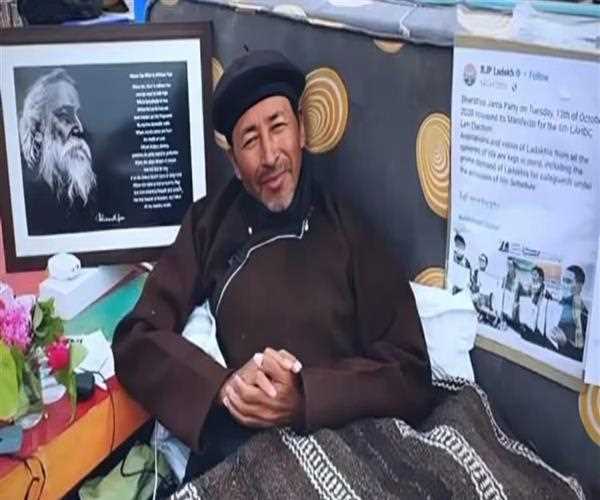
28-Mar-2024 , Updated on 3/29/2024 3:35:17 AM
Who is Sonam Wangchuk? led 21 days fast for climate change
Ladakh is a place in the world that was recently put in the spotlight by a courageous 21-day-long hunger strike of one of its most prominent figures, Sonam Wangchuk. He aimed to call attention to the imminent dangers of climate change in his region and to advocate for Ladakhi statehood. Wangchuk has been at the forefront of the region's environmental and social justice movements. His decision to wield this powerful symbol of nonviolent protest was an indication of the gravity of the problems that go beyond Ladakh but encompass the entire Himalayan ecosystem. In this blog, we take a look at Sonam Wangchuk and the reasons he took part in the strike, as well as see the implications his work has for both local communities and the world as a whole.
Who is Sonam Wangchuk?
Wangchuck is not only an Education reformer, a mechanical engineer, climate activist, and an icon of Ladakh cultural but also a native of the breathtaking region of Ladakh. Into the environment of the Himalayan range where he was born and grew up, Wangchuk's intense attachment to the place, the people living there, and his convictions towards nature protection and society justice became even stronger. He is also the Managing director of the Himalayan Institute of Alternatives, Ladakh (HIAL), and was valued for his work with the Magsaysay Award prize back in 2018. However, Wangchuk gained a lot of attention when the lead character was portrayed by Aamir Khan in the Bollywood movie "3 Idiots", which drew inspiration from his personal life.
The 21-Day Hunger Strike:
On the 6th of March, Lhakang A/ Mr. Wangchuk embarked on a 21-day fast in hunger strike --- let call it a "Climate Fast for 21 days (extendable till death)". This fast was to draw the attention of the issue of climate change, especially that of the world's highest mountain ranges: the Himalayan ranges. Striking a fast, in sub-zero temperatures in Ladakh, Wangchuk's work quickly gained the sympathy of subsistence farmers, activists, and environmentalists alike.
Soon the word of his hunger strike went viral and thus growing support among the masses as the people here and all around the world were rallying behind his cause. Wangchuk's willingness to disregard his own welfare for the good of the community represents his unshaken resolution to bring forth transformation despite all obstacles.
Motivations Behind the Protest:
The reason he took up a hunger strike was his strong believe that drastic measures should be taken to tackle climate change; such an emergency situation should be given priority, especially where the Himalayas can be listed as a fragile ecosystem. Being from Ladakh himself, Wangchuk has seen the provocative effects of climate change, where not only glaciers are melting rapidly but also unanticipated weather that hazard the lives of local farmers and herdsmen.
On top of that, his campaign to make Ladakh a state of the Indian Union and an area under the Sixth Schedule of the Constitution reflects his intention to protect Ladakh's distinctive ethos and allow for greater autonomy. Wangchuk uses his position as a well-known activist and thought leader to channel the opinions of unexposed groups of people and hold the leaders of policymaking institutions answerable for their pledges to environmental sustainability and societal justice.
Appeals to Government Leaders:
The whole process of hunger strike by Sonam Wangchuk is full of motivated and emotional requests to the Indian PM Narendra Modi and the Home Minister Amit Shah where he repeatedly advises them that protecting the Himalayan ecosystem is more important and promises given earlier to the Ladakh people should be delivered. Wangchuk's message to officials was not just a request for help but a message to the conscience of officials to provide a carefree future for the next generations.
He threw light on the principles of Lord Rama, highlighting the role of integrity and strong will to keep the promises- a message, by the way, touched the audience deeply across the country. In the face of political inertia and bureaucratic hindrances, Wangchuk came across as undaunted and he believed that leaders could let through the change that was needed when they acted with courage, compassion, and foresight, instead.
Impact and Future Action
Even though Sonam Wangchuk has concluded his hunger strike, his activism has been a source of hope and determination to those individuals and communities who are against climate change and social injustice. Through the conclusion of the hunger strike, the struggle has not ceased but intensified to bring out environmental sustainability in Ladakh as well as equitable development in Ladakh and beyond. As women protesters resolve to carry on with the climate fast, Wangchuk's legacy becomes a source of inspiration for future generations of activists and change agents. His vision of a fair and sustainable world which harnesses the power of grassroots campaigns and citizen engagement can be turned from a dream into a reality one where the suppressed voices are heard and in which the future of the planet is safe.
Conclusion
Finally, Sonam Wangchuk 21-day fasting can be described as a powerful symbol of the demand to solve climate problems which is one of the main concerns of Ladakh where people live in a harsh natural environment. The determination of his commitment to environmental conservation and social justice fires up hope for a brighter future in here community with nature is in harmony. Memory of Wangchuk's work draws strong messages to us – take action and work towards a world that is not only green but also fair enough for people of the future as well.

Student
An MBA in finance imparts and improves management aptitude, inventive ability, critical thinking ability, and so forth. It offers a real-time experience that fabricates a staunch career foundation for students and working professionals. It helps them to thoroughly understand the financial sector.
Comments
Join Our Newsletter
Subscribe to our newsletter to receive emails about new views posts, releases and updates.
Copyright 2010 - 2026 MindStick Software Pvt. Ltd. All Rights Reserved Privacy Policy | Terms & Conditions | Cookie Policy